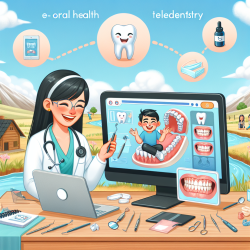Introduction
As a Special Education Director, I am keenly aware of the challenges faced by practitioners in delivering quality healthcare in rural and remote areas. The recent systematic review titled "Patient satisfaction with e-oral health care in rural and remote settings" sheds light on how e-oral health technologies can be leveraged to improve patient satisfaction and healthcare delivery in these underserved areas. This blog aims to provide insights for practitioners on how they can enhance their skills and services by integrating e-oral health solutions.
Understanding E-Oral Health Benefits
The systematic review highlights several key benefits of e-oral health technologies, particularly in rural and remote settings. These include:
- Increased patient satisfaction due to reduced travel time and prompt treatment initiation.
- Cost-effectiveness and savings on travel and accommodation expenses for patients.
- Diagnostic reliability and validity comparable to conventional dental consultations.
- Improved access to specialist services through teleconsultations.
For practitioners, these benefits translate into opportunities to enhance service delivery, improve patient outcomes, and expand their reach to underserved communities.
Implementing E-Oral Health Solutions
Practitioners looking to implement e-oral health solutions can start by exploring teleconsultation platforms that suit their practice needs. Here are some steps to consider:
- Training and Familiarization: Invest in training for yourself and your team to become proficient in using telehealth technologies. Familiarity with equipment and procedures is crucial for effective implementation.
- Infrastructure Setup: Ensure that you have the necessary infrastructure, such as high-speed internet and reliable teleconsultation software, to support seamless virtual consultations.
- Patient Education: Educate your patients about the benefits and use of e-oral health services. Address any concerns they may have about privacy and the quality of care.
- Collaboration with Specialists: Establish partnerships with specialists who can provide teleconsultation services, enabling you to offer a broader range of services to your patients.
Encouraging Further Research
While the systematic review provides valuable insights, it also highlights the need for further research to address methodological inconsistencies and enhance the evidence base for e-oral health technologies. Practitioners are encouraged to participate in or support research initiatives that explore:
- Long-term cohort studies and clinical trials to assess the effectiveness and cost-benefit of e-oral health solutions.
- Patient-centered approaches to evaluate satisfaction and experiences with e-oral health services.
- The role of e-oral health in addressing healthcare disparities in rural and remote areas.
By contributing to research efforts, practitioners can help shape the future of e-oral health and ensure its integration into mainstream healthcare.
Conclusion
Integrating e-oral health technologies into practice offers a promising avenue for improving healthcare delivery in rural and remote settings. By enhancing their skills and embracing telehealth solutions, practitioners can provide more accessible, cost-effective, and satisfactory care to their patients. To delve deeper into the findings of the systematic review, I encourage you to read the original research paper: Patient satisfaction with e-oral health care in rural and remote settings: a systematic review.










